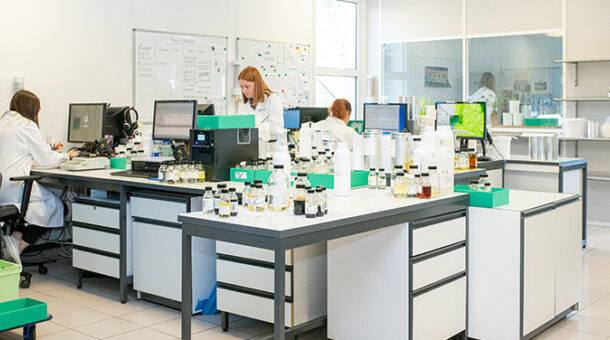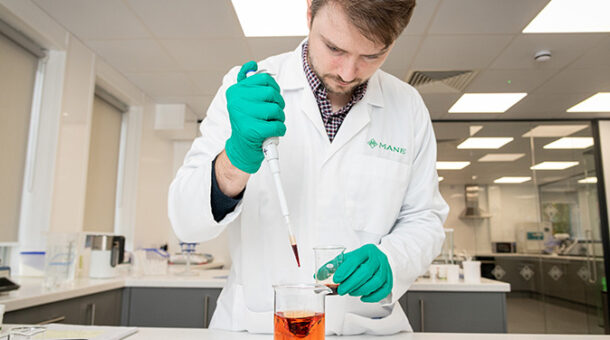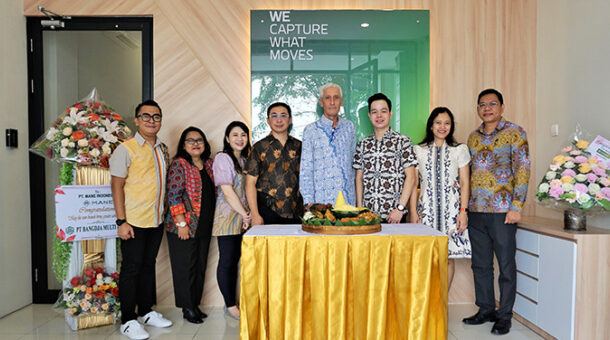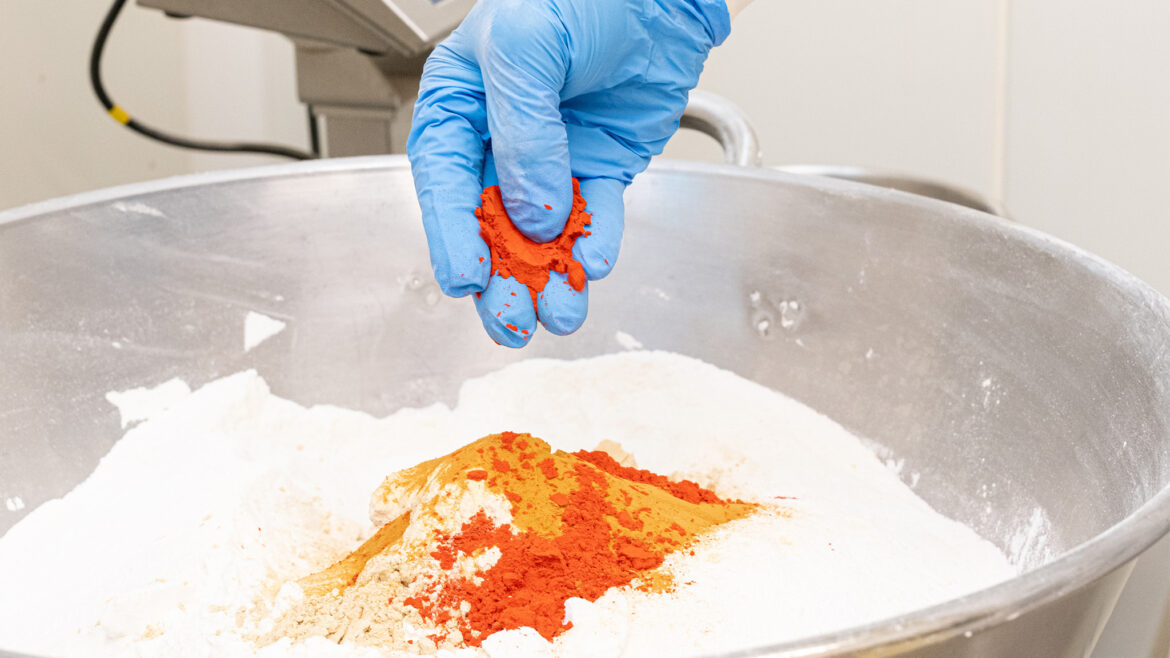It takes a broad range of skills to produce nearly 7,500 tonnes of savoury flavouring powder a year… Blending needs to be consistent, cross-contamination must be avoided, and production has to be planned in meticulous detail. MANE’s plant at Sablé-sur-Sarthe has proven expertise in all these areas, making it a prized asset within the Group.
When MANE decided 25 years ago to diversify its business and move into flavourings for the meat industry, the search began for a suitable production plant and a good location for serving customers. The Group found both in a site at Sablé-sur-Sarthe in northwest France. Owned by France Protéines Services, the business already had expert knowledge of producing flavourings and other ingredients for clients in the meat sector. Better still, the surrounding Pays de Loire region was well-known as a centre for the agri-food industry. Since the initial acquisition in 1998, MANE has substantially increased its presence at Sablé-sur-Sarthe, adding a logistics hub just a few kilometres away from the production plant.
Handling several hundred recipes a year…
All the savoury flavourings manufactured here are of natural origin, with each powder being adapted in terms of colour and texture to suit a particular food ingredient. “We have two key areas of expertise,” says Nicolas Nourtier, Director of Industrial Operations at MANE Sablé-sur-Sarthe. “The first is in being absolutely consistent with our powder mixes. For our clients, it’s vital that every batch of the product has the same colours, the same flavour notes, and the same fluidity. The second area is our ability to manage the issue of cross-contamination. It’s crucial. A recipe containing an allergen must not contaminate another recipe. To deal with this, we have built a particular expertise in the scheduling of production runs, allowing us to work on multiple recipes with different allergens at the same time.”
… and 8,000 production runs
The site manufactures more than 600 recipes a year, each of which might contain as few as 5 ingredients or as many as 40, with the volumes ranging from just a few kilogrammes to several hundred tonnes. Each stage of the process, whether it involves production or cleaning the equipment, is carefully organised in advance by the planning department. In practice, it means the production day starts with the lighter-coloured recipes and ends with the darker ones. The very last run is devoted to the recipe with the highest number of allergens. In total, more than 8,000 production runs are carried out at the plant every year!
“You will find our powders in a larger number of foods, and a lot of them involve paprika, pepper and spice notes,” says Nicolas Nourtier. “They’re ultra-concentrated and specifically designed to provide a particular characteristic or flavour.” The powders made at Sablé-sur-Sarthe are used in a range of products, including:
- snacks (crisps, finger food to accompany drinks)
- ready meals (pasta, purees, vegetables, soups, etc.)
- meat products (sausages, minced beef, stock, etc.).
To cater for such a wide variety of recipes, more than a hundred different raw materials are stored on-site, with some of them used in large quantities, notably salt, sugar and milk powder.
Strict rules on hygiene and safety
Strict hygiene and safety rules are in place for the handling of the various powders, including the wearing of personal protection equipment (PPE) such as respiratory devices, highly ventilated hoods, masks and gloves. Meanwhile, an air extraction and filtration system collects powder dust and any airborne production waste.
To meet the needs of a wide range of consumers, the site is approved for specific labelling regimes, such as organic, halal and kosher, along with three certification standards:
- ISO 14001, an environmental management system focused on reducing energy intensity
- SMETA (Sedex Members Ethical Trade Audit), an ethical audit methodology that encompasses all aspects of responsible business practice
- British Retail Consortium, a prerequisite to export to the United Kingdom, protecting British consumers and setting high standards of food safety.
The site’s management have also taken several initiatives to reduce the environmental impact:
- forthcoming installation of solar panels, with the aim of generating 15% of the site’s electricity needs by 2025
- LED lighting
- establishment of a partnership with a neighbouring centre for the anaerobic digestion of the site's organic waste and the production of biogas.
“In terms of annual production volumes, our site has been growing at nearly 10% every year,” says Nicolas Courtier. “Such an achievement would not have been possible without our teams being committed to the company and proud to work for the MANE Group. They are always involved in discussions about organisational change or the introduction of new machinery. We also focus on employee development, providing mentoring and skills training, along with onboarding programmes for new production staff. Every day, I try to promote certain key values, namely diligence, goodwill and continuous improvement at work.” For 25 years, those values have clearly borne fruit at Sablé-sur-Sarthe.






